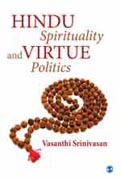
Hindu Sprirituality and Virtue Politics analyzes the writings of four thinkers—S. Radhakrishnan, Vinoba Bhave, C. Rajagopalachari and A.K. Coomaraswamy. It highlights their notions of Hindu spirituality and its relationship to politics. The author argues that there are two different visions of how Hindu spirituality is linked to modern liberal politics. The first, more popular vision draws from Vedanta ideals and moves toward a tight fit between spirituality and politics. The goal is a union of the two spheres or at least subordination of the political to the spiritual realm. To this end, there are exhortations to anchor politics in first principles, transform human nature and realize genuine swaraj or self rule. Coomaraswamy, Radhakrishnan and Vinoba suggest that Hindu spirituality must absorb politics and lead to a state of genuine freedom and democracy. Usually such spirituality leads toward conservative politics which decries modern ideals of universal freedom and equality. For instance, Coomaraswamy’s apologetics about caste or women’s subordination might seem as if spiritual politics was nostalgic and patriarchal. Or Vinoba’s appeal to non-possession and non-violence makes spiritual politics seem saintly and utopian. But this need not be all there is to Hindu spirituality. The volume examines the alternative vision that is present in all these writers. Drawing upon myths, symbols and epics rather than the abstract theology of Vedanta, it explores a subtler and realistic fit between spirituality and politics. For example, when Vinoba invokes the famous myth of Vamana and Bali during his bhoodan tours to elicit land gifts, he suggests a more realistic ‘spiritual politics’; one that appeals to the desire for honour and glory in the rich and the mighty. He attempts to unleash generosity to moderate the acquisitive passions in the people. When Rajagopalachari renders the epics into English, he tries to highlight the virtues of tolerance and friendship to invigorate modern citizenship and statesmanship. Vinoba and Rajaji understood the value of Hindu spiritual traditions in fostering civic virtues such as liberality, trust, hard work and friendship. With Coomaraswamy, the book shows that spirituality goes beyond morality to metaphysics in a manner that can deepen contemporary critiques of politics. INDICE: Preface and AcknowledgementsIntroductionMonistic Vedanta and Cosmic Evolution: S. Radhakrishnan’s Integral ApproachSaintly Visions and Kingly Models: Vinoba Bhave’s Ethical ApproachDevotional Hinduism and Moral Virtues: C. Rajagopalachari’s Prudent ApproachCosmogonic Myths and the Perils of Contemplation: Ananda Kentish Coomaraswamy’s Metaphysical ApproachConclusionGlossaryBibliographyIndex
- ISBN: 978-8-1321-1345-4
- Editorial: SAGE Publications Pvt. Ltd
- Encuadernacion: Cartoné
- Páginas: 180
- Fecha Publicación: 30/10/2013
- Nº Volúmenes: 1
- Idioma:
